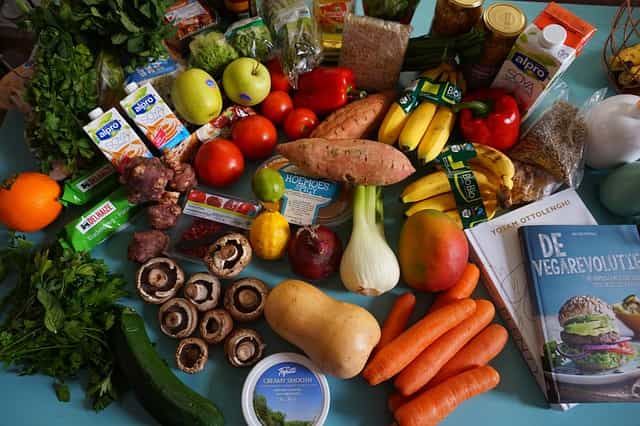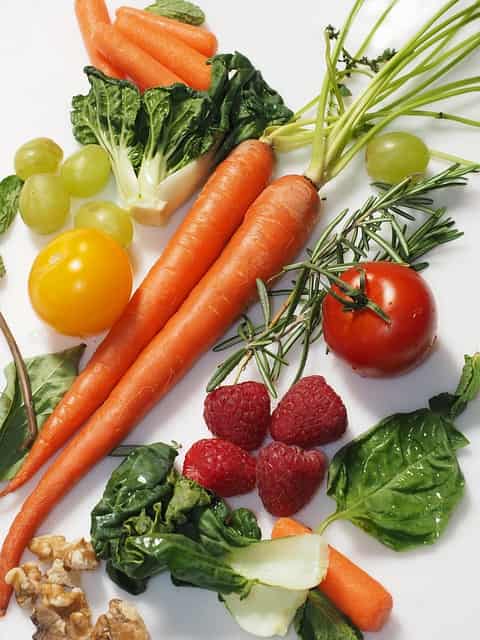THE STRENGTH OF FRUITS AND VEGETABLES RAINBOW ON YOUR PLATE: EXPLORING THE NUTRITIONAL DENSITY IN 2 FOOD GROUPS
Fruits and vegetables

Fruits and vegetables must be a daily diet plan. The fruits and vegetables are rich sources of vitamins and minerals which play vital role in growth and development. Fruits and vegetables also protect against certain diseases and also improve immunity.

The vegetables and fruits have a lot of variety and every variety contain different nutritional value. The Australian Dietary Guidelines recommends daily intake of at least 5 different vegetables and 2 different fruits every day.
World Health Organization (WHO) recommended 5 portions or 400g of daily intake of fruits and vegetables each day. According to them such daily intake provides ample amount of energy, nutrition and minerals and helps in protection against certain diseases.
One could consume fresh fruits and vegetables but if they are not available then frozen fruits and vegetables may be consumed but prefer fresh alternatives. One should take at least 5 servings of vegetables and 2 servings of fruits daily.
There is lot of attention on healthy life style, balanced diet and nutrition. But still, there are many people who do not eat or prefer to eat vegetables and fruits in their daily meal. In such cases one could start fruits and vegetables slowly to get nutrition and to get use to it.
HOW FRUITS AND VEGETABLES ARE NUTRITIOUS AND HEALTH SUPPORTIVE?
Fruits and vegetables are healthy and nutrition dense because they carry vitamins and minerals which further perform certain important function inside the body. Lot of them is considered as antioxidants which help in protection against certain diseases.
The essential vitamins and minerals which fruits and vegetables carry are as follows:
| Fruits | Vegetables |
| Vitamin A, Vitamin C, Folic Acid, Magnesium (Mg), Potassium (k), Fibers, Phytochemicals. | Vitamin A, Vitamin C, Folic Acid, Magnesium (Mg), Potassium (k), Fibers, Antioxidants, Calcium, Iron |
The research also posits that it is more healthy and nutritious to consume fruits and vegetables rather using other supplements.
Fruits and vegetables are healthy as they carry low amounts of salt, fats and sugars rather they carry dietary fibers to further feel you full and facilitate in avoiding over eating.
The intake of fruits and vegetables further helps in controlling certain disease like
- Obesity
- High blood pressure
- High cholesterol levels
WHICH FRUITS ONE SHOULD PREFERABLY USE?
All fruits are healthy and nutritious but there are certain fruits which brings more nutritional density and healthier like
- Apples and pear
- Oranges, grapefruits and limes
- Apricots, peach and plums
- Banana
- Mango
- Strawberries, blueberries, and kiwi fruits
- Watermelons
- Avocado
- Tomato
WHICH VEGETABLE ONE SHOULD PREFERABLY USE?
All vegetables are nutritious and rich with vitamins and minerals but there are certain vegetables which are more nutritious and healthy like:
- Spinach
- Lettuce
- Cabbage
- Cauliflower
- Broccoli
- Pumpkin
- Potato
- Asparagus
- Onion
- Garlic
The daily intakes of the vegetables also provide high antioxidant substance to protect you against certain diseases.
HOW COLOR OF FRUITS AND VEGETABLES CONTRIBUTES IN MORE NUTRITION?
It is observed that the same color food contain similar amounts of same vitamins and mineral and other protective compounds more or less. Therefore, it is recommended to use different color fruits and vegetables. For instance:
- Red fruits like watermelon and tomatoes carry lycopene which is extremely beneficial against fighting prostrate cancer and heart diseases.
- Leafy Green vegetables like spinach and kale carry lutein and zeaxanthin which helps in protection against eye diseases
- Purple/blue fruits contain anthocyanins which protect against cancers.
WHICH NUTRIENTS FRUITS AND VEGETABLES PROVIDE AND WHAT THEY DO?
The fruits and vegetables provide many micronutrients which protect against certain diseases and perform some really important functions inside the body. Let’s share some insight regarding micronutrients provided by fruits and vegetables and elaborate the role of them in fighting against diseases:
| Vitamins/Minerals | Functions | Sources | Effects of deficiency |
| Vitamin A | Vision , immunity booster, helps in bone growth | Red and green vegetables like carrots, pumpkin, tomato and other fruits | Vision problems, Dry skin, Recurrent infections |
| Vitamin E | Prevent oxidation | Oils extracted from vegetables | Red cells breakdown |
| Vitamin K | Helps in blood clotting | Green vegetables like spinach | Hemophilia |
| Pyridoxine | Helps in making blood | Potato and banana | Dry skin, Blisters on skin, Blood deficiency, Depression |
| Folate | Helps in blood making and cells division | Green vegetables | Lethargy, Weakness, Anemia, Birth defects in new born |
| Vitamin C | Hormones development and stop oxidation | Oranges, pumpkin, strawberries and green vegetables | Slow wound healing, Bleeding from gums |
| Iron | Blood making, give energy and enhance immunity | Green vegetables like spinach | Lethargy, Weakness, Jaundice, Headache, Cold hands and feet |
WHAT ARE RECOMMENDED SERVINGS OF FRUITS AND VEGETABLES?
One could make a customized serving as well by consulting some dietician or nutritionist. However, there are some recommended daily intake of fruits and vegetables which further helps in healthy and active life style patterns. Such as:
- ½ cup of cooked spinach, broccoli, pumpkin or carrots
- ½ cup without adding salt dried or canned beans, lentils or peas.
- 1 cup salad or vegetables
- 1 banana , apple , orange or pear
- 2 medium sized or small apricot, plum or kiwi fruit
- 1 cup of fruits
- Occasionally use ½ cup or 125ml fruits juice
One more thing needs attention that most of the people prefer fruits juices on fresh fruits. This tendency should be minimized because raw fruits are more nutritious tan fruit juices. Actually lot of people drink juices and add further sugars in it which destroys the nutritional density in fruits and become health injurious rather being healthy. So, use of sugar in juices and shakes must be avoided.
WHAT IS THE ROLE OF FRUITS AND VEGETABLES IN FIGHTING AGAINST MAJOR DISEASES?
The vegetables and fruits not only provide us with essential nutrients but also protect against disease due to inclusion of certain Phytochemicals and other compounds. The role of them in fighting against diseases is as follows:
Cardiovascular Diseases
A Meta study conducted on 469551 participants shows that the higher intake of vegetables and fruits minimizes the death probability through heart diseases. Research further posits that about 4% risk may be reduced through such daily intake of vegetables and fruits.
The research is evident of the fact that the 8 daily servings of vegetables and fruits reduced the risk of heart disease up to 30%.
It is also noticed that fruits and vegetables like spinach, broccoli, cauliflower, kale, lettuce, mustard green, oranges, cabbage, lemons, grapefruits and limes protects against cardiovascular diseases.
Blood pressure
DASH (Dietary Approaches to Stop Hypertension) examined the effects of balanced diet including vegetables and fruits on blood pressure. The results of the study revealed that by following the recommended daily meals of fruits and vegetables may reduce the systolic blood pressure by 11mm Hg and diastolic blood pressure by 6 mm Hg.
The OmniHeart (Optimal Macronutrient Intake Trial for Heart Health) trial reveals that daily intake of fruits and vegetables may lower the risk of high blood pressures and it may further enhance when carbohydrates may be replaced with the proteins and unsaturated fats.
Cancer
The role of vegetables and fruits against development and protection of cancer is still requiring research. However there are some studies conducted in this domain found out that daily intake of fruits along with vegetables may reduce the risk of cancer.
A study conducted by Farvid and Colleagues on 90,476 premenopausal women for 22 years. The findings shows that the women who ate about 3 servings of fruit and vegetables a day in comparison to the women who ate o.5 servings a day are 25% less prone to developing breast cancers in later ages.
After a comprehensive study on 182,145 women for 30 years in Nurses’ Health Study I and II , the results reveals that the women who take 5.5 servings of vegetables and fruits each day are having 11% less chances to encounter breast cancer in later stages of life.
The daily vegetable consumption of 2 additional serving further minimizes the probability of estrogen-receptor negative tumors.
Diabetes
The study conducted on about 70000 nurses from 38-63 years of age reveals the vegetables and fruits daily intake chances of occurring diabetes may be reduced drastically.
Another study conducted on 2300 males revealed that the daily allowances of fruits along with green vegetables reduce the chances of type 2 diabetes.
Gastrointestinal Health Problems
The studies also supports that the daily consumption of vegetables along with fruits helps in relaxing the overall digestive system and relieve the irritable bowel syndrome and prevent constipation.
Vision
The studies show that the daily adequate intake of vegetables and fruits reduces the chances of vision problems like cataracts and macular degeneration. Therefore, adequate amounts of vegetables and fruits should be in your daily meal plans.
CONCLUSION
Fruits and vegetables provide essential nutrients, vitamins and minerals which facilitate in body growth and development. The vegetables and fruits provide vitamin A, Vitamin C, Vitamin E, magnesium, folate, iron and zinc.
The daily intake of vegetables along with fruits may help in protection against certain cardiovascular, gastro intestinal, vision related problems and other major diseases like diabetes.
The use of vegetables and fruits must be in recommended amounts because fewer quantities are not as much supportive. Therefore, the consultation with dietician or nutritionist may further help in chalking out the appropriate and balanced meal plan.
The proper cooking and serving with adequate care and hygiene are also important factors because contaminations or over cooking may destroy the nutritional base of vegetable and fruits.
So, the need of time is to take as much as fruits and vegetables to avoid diseases and to make a healthy and active life style.
FAQs
WHICH FRUITS AND VEGETABLES ONE SHOULD PREFERABLY USE?
All Fruits and vegetables are good for health , however yellow fruits and green vegetables are good sources of vitamin and minerals
WHAT TYPE OF VITAMINS AND MINERALS FRUITS AND VEGETABLES PROVIDE?
Vitamin A, Vitamin C, Vitamin E, Zinc, Iron, Folate, Magnesium and Potassium
WHICH DISEASES COULD BE CONTROLLED THROUGH EATING FRUITS AND VEGETABLE?
Diabetes, Heart diseases, Cancer, Gastro intestinal issues and vision problems






